2019 Local Labor News
Click on link for past labor news articles: 2006 | 2007 | 2008 | 2009 | 2010 | 2011 | 2012 | 2013 | 2014 | 2015 | 2016 | 2017 | 2018
Published Monday, December 16, 2019 in The Seattle Times
Boeing Will Halt Renton Assembly Lines for 737 MAX, But No Layoffs for Employees
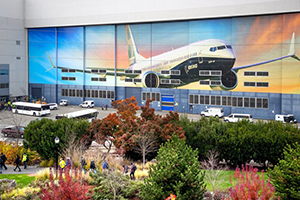
By Dominic Gates and Paul Roberts
Seattle Times aerospace reporters
Nine months after the Federal Aviation Administration (FAA) grounded the 737 MAX, Boeing finally pulled the plug on the jet’s production Monday. The company announced it’s temporarily halting the assembly lines in Renton from January, with no specified timeline for a restart.
However, in a welcome surprise for the 12,000-strong Renton workforce, Boeing said there will be no layoffs.
“During this time, it is our plan that affected employees will continue 737-related work, or be temporarily assigned to other teams in Puget Sound,” Boeing said in a statement.
Boeing has faced an unprecedented crisis, with more than 700 MAX aircraft grounded worldwide, including nearly 400 built since the grounding. Many have been in storage so long they’ll need extensive maintenance before they fly. The production stoppage will stop the parked fleet from growing to unmanageable proportions, while retaining the workforce will allow a smoother restart of the assembly lines when that time comes.
Boeing’s announcement left many details unanswered, in particular the scale of the financial hit to Boeing and the impact on suppliers. For employees, the news of a shutdown was worrying, yet came with the relief that their jobs would continue.
As workers left the factory Monday afternoon, many were reading about the Boeing statement on their phones.
“That’s good news,” said one worker as he crossed Logan Avenue in front of the soon-to-be-idled plant. “I didn’t want to be laid off.”
Earlier in the day, many workers had been speculating and hoping that Boeing wouldn’t idle the plant, wary that the disruption could not only hurt their paychecks but would bring huge costs to restart production once the MAX is recertified to carry passengers.
“I just can’t imagine them shutting this place down,” said one longtime worker. “I mean, all the vendors? It would be a mess.”
Others said they’d been expecting the news for some time. “The delay in recertification is on everybody’s mind,” said one longtime employee. Read entire article
Published Wednesday, December 11, 2019 at vice.com
U.S. Employers Spend $340 Million a Year Busting Unions
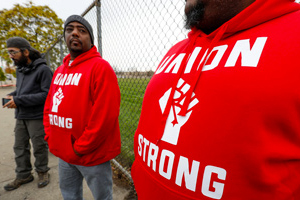
Experts say the tech industry is no exception.
2019 has been a historic year for the labor movement in tech. Google contractors in Pittsburgh unionized. Kickstarter launched a campaign to form what could become the first union at a major tech company. Amazon warehouse workers, Uber drivers, and Instacart grocery delivery workers went on strike.
Tech companies haven’t stood idly by—even those that have long touted progressive values. Google, for one, hired an anti-union consulting firm IRI Consultants in the spring, and fired four workers last month who were organizing for changes at the company. Kickstarter fired two employees who were leading a union campaign at the crowd-sourcing company in September. (Kickstarter claims the workers were fired for performance-related reasons, and denies any retaliation for union organizing.)
A new report on employer opposition to union campaigns released today by the Economic Policy Institute (EPI) found that employers spend hundreds of millions of dollars a year against union organizing efforts, and were charged with breaking federal labor laws in 41.5 percent of union campaigns in 2016 and 2017. While the authors of the report, who gained access to unfair labor complaints through FOIA requests, could not comment on specific cases, they say the newly organized tech industry is no exception.
“Tech companies have traditionally set themselves aside as a cutting-edge employers. But what you’re seeing increasingly is that they behave the same way as Walmarts and Targets,” Celine McNicholas, one of the report’s authors who reviewed thousands of complaints filed with the NLRB, told Motherboard.. “When faced with demands of improved working conditions and respecting workers’ voices, they turn to union avoidance consultants. They’d rather spend the money there than on addressing the demands of their workforce.”
Under the most conservative estimates, the authors find that employers are charged with unlawfully firing workers in nearly 20 percent of union campaigns. Nearly one third of the union campaigns filed with the NLRB in 2016 and 2017 involved reports of illegal coercion, threats, or retaliation against workers for supporting a union, the study found.
The report also provides important new information on the union avoidance industry, which includes anti-union law and consulting firms. According to new data, U.S. employers spend nearly $340 million each year on advisors that conduct “union vulnerability tests” and provide companies with important recommendations for crushing union drives at their companies. IRI Consultants, the firm Google hired this year, advertises on its website that it “implement[s] successful educational campaigns designed to inform employees about the true impact and cost of unionization in the workplace.” Read entire article
Published Wednesday, December 11, 2019 in The Stand
AFL-CIO Endorses USMCA After Negotiating Labor Improvements

WASHINGTON, D.C. — The following statement by AFL-CIO President Richard Trumka was issued this morning, provided the final USMCA text accurately reflects the changes:
Make no mistake, we demanded a trade deal that benefits workers and fought every single day to negotiate that deal; and now we have secured an agreement that working people can proudly support.
I am grateful to House Speaker Nancy Pelosi and her allies on the USMCA working group, along with Senate champions like Sherrod Brown and Ron Wyden, for standing strong with us throughout this process as we demanded a truly enforceable agreement. I also commend Ambassador Robert Lighthizer for being a straight shooter and an honest broker as we worked toward a resolution.
Working people are responsible for a deal that is a vast improvement over both the original NAFTA and the flawed proposal brought forward in 2017. For the first time, there truly will be enforceable labor standards — including a process that allows for the inspections of factories and facilities that are not living up to their obligations.
The USMCA also eliminates special carve outs for corporations like the giveaway to Big Pharma in the administration’s initial proposal and loopholes designed to make it harder to prosecute labor violations.
The USMCA is far from perfect. It alone is not a solution for outsourcing, inequality or climate change. Successfully tackling these issues requires a full-court press of economic policies that empower workers, including the repeal of tax cuts which reward companies for shipping our jobs overseas.
But there is no denying that the trade rules in America will now be fairer because of our hard work and perseverance. Working people have created a new standard for future trade negotiations.
President Trump may have opened this deal. But working people closed it. And for that, we should be very proud.
https://www.thestand.org/?p=82310
Published Friday, November 29, 2019 at fox10phoenix.com
Walmart Facing Backlash for Offering Employees Discount Instead of Holiday Pay

By Gabrielle Moreira
Many people on social media expressed outrage and urged others to boycott Walmart because the retail giant reportedly does not pay its employees overtime for working the holidays and instead offers them a small in-store discount.
The Guardian reported on Wednesday that Walmart offered its employees a 10 percent and 15 percent in-store discount for working the holidays. The 15 percent discount is only available for employees during two days in December, according to a flyer the publication obtained.
In a statement, Walmart told Business Insider that no longer offering employees holiday pay has been its policy for a few years.
“We simplified our paid time-off policies in 2016 to combine vacation, holiday, sick and personal time into one bucket,” a spokesperson told Business Insider. “As part of that change, we no longer offer holiday pay.”
Overtime pay is not legally required for people who work “on weekends, holidays or regular days of rest, unless overtime is worked on such days,” according to the U.S. Department of Labor.
Walmart was one of several national chain stores open during Thanksgiving and Black Friday.
https://www.fox10phoenix.com/news/
Published Thursday, November 21, 2019 in The Stand
Join Major Protest Nov. 26 at Sea-Tac Airport
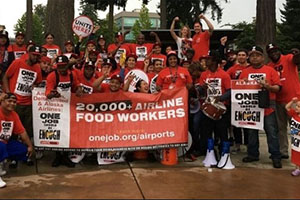
WSLC urges union members to support UNITE HERE Local 8 airline catering workers at pre-Thanksgiving action
SEATAC — All union members and community supporters are invited to join UNITE HERE Local 8 airline catering workers at a protest at SeaTac Airport on Nov. 26 — the Tuesday before Thanksgiving and one of the busiest travel days of the year. They will join nationwide protests at more than 20 U.S. airports.
Through this march, workers will call on airlines to take urgent and necessary steps to ensure that workers who cater in-flight meals and beverages are able to escape poverty and access medical care. Over the summer, airline catering workers at SeaTac Airport voted overwhelmingly to authorize a strike when released, and federal mediation of contract negotiations continues.
TAKE A STAND! — The Washington State Labor Council, AFL-CIO urges all to join airline catering workers at the action on Tuesday, Nov. 26. Meet at 5:30 p.m. at the UNITE HERE 8 SeaTac office at the IBEW 77 building, 19415 International Blvd. in SeaTac (across from Angle Lake Park). Buses will leave at 5:45 p.m. to go to the airport. Please click here to RSVP that you plan to attend.
This will be among UNITE HERE Local 8’s largest protests ever at SeaTac Airport, and, collectively, this will be the largest demonstration of workers at U.S. airports in years.
UNITE HERE represents 18,000 airline catering workers at 40 airports. Most provide service primarily to Alaska, American, United and Delta airlines, which have made a combined profit of $50 billion over the last five years. The majority of workers at the nation’s two leading airline catering employers, LSG Sky Chefs and Gate Gourmet, earn less than $15 per hour and do not have affordable family health insurance. In SeaTac, 844 workers work for Sky Chefs and Gate Gourmet. They are predominantly people of color, and many are immigrants from around the world.
UNITE HERE Local 8 is the hospitality workers’ union and represents over 5,000 members working in the hotel, food service, and airport industries in Washington and Oregon, including 900 airline food workers at SeaTac Airport. Learn more at www.unitehere8.org.
https://www.thestand.org/?p=81845
Published Friday, November 15, 2019 in The Seattle Times
Boeing Abandons Its Failed Fuselage Robots on the 777X, Handing the Job Back to Machinists
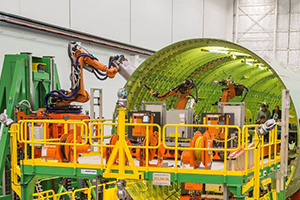
By Dominic Gates
Seattle Times aerospace reporter
After enduring a manufacturing mess that spanned six years and cost millions of dollars as it implemented a large-scale robotic system for automated assembly of the 777 fuselage, Boeing has abandoned the robots and will go back to relying more on its human machinists.
Boeing said Wednesday it is adopting a different approach that “has proven more reliable, requiring less work by hand and less rework, than what the robots were capable of.”
The robotic system entailed holding the large curved metal panels that make up the 777 fuselage sections right-side up in a cradle as the moving robots stitched the panels together, drilling holes and adding tens of thousands of fasteners.
Because this was different from the traditional build process in which the lower fuselage was built upside down, then flipped before the upper fuselage was added, Boeing awkwardly dubbed it the “Fuselage Automated Upright Build” process or FAUB.
The main system used on the forward and aft fuselage sections involved mechanics tacking the panels together then stepping back to let four robots apply permanent fasteners.
One pair of robots drilled and fastened in unison on the upper half of the fuselage section — one inside, one outside. The outside robot inserted a rivet while the inside one simultaneously flattened it at the other end to create the fastening. A second pair of robots worked the lower half in similar fashion.
The technology was implemented gradually from 2015 inside a new building on the Everett site. But right from the start, the robots proved painful to set up and error-prone, producing damaged fuselages and others that were incompletely assembled and had to be finished by hand. Read entire article
Published October 12, 2019 in MLT News
Trade Up! Introduces High School Students to a Career Path After Graduation
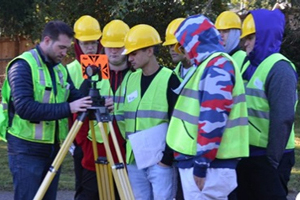
By Cody Sexton
Local high school students received a hands-on demonstration October 10th of career opportunities in trade jobs available outside of a college education.
The Edmonds School District, through a partnership with the Foundation for Edmonds School District and Snohomish County Labor, hosted Trade Up! — a hands-on exploration in trades like carpentry, electrical work and concrete laying.
More than 70 high school students — a majority of which were juniors and seniors — attended the event on the former-Alderwood Middle School campus.
“The idea of this event is to get kids who are graduating into apprenticeships,” said College and Career Readiness Coordinator Susan Beard.
After hearing about the event’s success in north Snohomish County high schools, Beard said she was dedicated to bringing it to the Edmonds School District. According to Beard, the district has been working to educate students on alternative career paths besides earning a college degree, such as receiving non-degree credentials.
“If you have a credential, that means you have a skill set,” she said. “So, we’re really working hard to talk about credentialing versus college degrees.”
A dozen industry representatives attended the event, including Community Transit, Snohomish County PUD, Sno County 911 operators, sheet metal and electrical workers, Laborers 292, and members of the finishing trades, carpenters union and concrete masons. There were also land surveyors, waste management workers and an engineering simulators team.
As students rotated through each trade, they were able to participate in hands-on activities like using a concrete breaker or land surveying equipment and building circuit boards used in waste management. Students also learned about benefits of unionized trade jobs, like competitive pay, medical and dental benefits and pension plans.
This is the first year the district hosted the event, which began when Leonard Kelley, Stanwood mayor and executive secretary-treasurer of Snohomish County Labor Council, said he noticed the need for more trade workers as many began to retire.
“We have a shortage of workers,” he said. “So, we thought, ‘What can we do to get kids the information?’” Read entire article
Published October 7, 2019 in The Washington Post
Trump Administration Tells Agencies to Restrict Unions in the Workplace
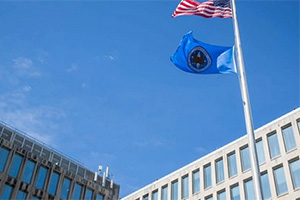
By Eric Yoder
Federal agencies have been told to carry out Trump administration directives aimed at restricting the role of unions in the federal workplace and giving agencies the maximum discretion in taking disciplinary actions against employees, now that a court ban against many of those policies has been lifted.
The policies “are in full force and effect” and agencies should “ensure that they are fully compliant with all requirements or are taking steps to become compliant with requirements at the soonest feasible opportunity,” the central personnel agency said in a memo issued Friday.
The Office of Personnel Management’s memo came just days after a court lifted a year-long injunction in a union-sponsored lawsuit against three executive orders issued in May 2018.
Several months later, a federal district court agreed with the unions that major parts of the orders overstepped the president’s authority under civil service law.
However, in July of this year a federal appeals court held, without ruling on that issue, that the dispute belongs instead before the Federal Labor Relations Authority, which decides on disputes between agencies and unions.
Most of the provisions at issue involve topics of importance in workplaces with union bargaining units, including to limit the topics on which bargaining will be held, set time limits on negotiations and significantly reduce “official time,” which is paid time that employees may use for certain union-related purposes, and other accommodations to unions such as free use of office space.
The unions still have the option of a further appeal to the Supreme Court, but for the meantime the focus will shift to the bargaining table and then to the FLRA.
“Any attempts by agencies to enforce these provisions outside of the collective bargaining process will be met with immediate legal challenge by the union,” said American Federation of Government Employees president J. David Cox Sr., who said the intent of the orders is to “remove unions from the worksite and make it harder for our members to report mismanagement or other abuses.” Read entire article
Published October 7, 2019 in The Seattle Times
Boeing Rejected 737 MAX Safety Upgrades Before Fatal Crashes, Whistleblower Says
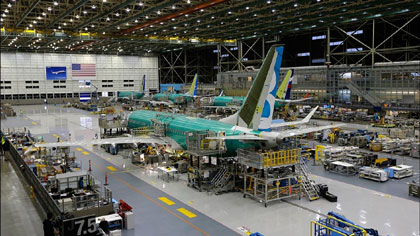
By Dominic Gates, Steve Miletich and Lewis Kamb
Seven weeks after the second fatal crash of a 737 MAX in March, a Boeing engineer submitted a scathing internal ethics complaint alleging that management — determined to keep down costs for airline customers — had blocked significant safety improvements during the jet’s development.
The ethics charge, filed by 33-year-old engineer Curtis Ewbank, whose job involved studying past crashes and using that information to make new planes safer, describes how around 2014 his group presented to managers and senior executives a proposal to add various safety upgrades to the MAX.
The complaint, a copy of which was reviewed by The Seattle Times, suggests that one of the proposed systems could have potentially prevented the crashes in Indonesia and Ethiopia that killed 346 people. Three of Ewbank’s former colleagues interviewed for this story concurred.
The details revealed in the ethics complaint raise new questions about the culture at Boeing and whether the long-held imperative that safety must be the overarching priority was compromised on the MAX by business considerations and management’s focus on schedule and cost.
Managers twice rejected adding the new system on the basis of “cost and potential (pilot) training impact,” the complaint states. It was then raised a third time in a meeting with 737 MAX chief project engineer, Michael Teal, who cited the same objections as he killed the proposal.
A version of the proposed system, called synthetic airspeed, was already installed on the 787 Dreamliner.
It was not directly related to the flight-control system — the Maneuvering Characteristics Augmentation System (MCAS) — that contributed to both crashes. But it would have detected the false angle of attack signal that initiated events in both accidents, and so potentially could have stopped MCAS from activating and repeatedly pushing down the nose of each jet. Read entire article
Press Release - September 28, 2019 by UFCW 555
UFCW 555 Reaches Tentative Agreement - Boycott Ends
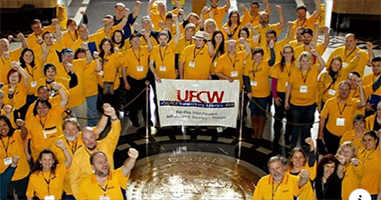
UFCW Local 555 reaches a Tentative Agreement with grocery employers in the thirteenth negotiation session; Fred Meyer boycott ends (effective immediately)
This month’s scheduled two-day session with the employers’ negotiation team and the Unity Bargaining Team (joined for the first time by a federal mediator upon request from Local 555) went throughout the night on the 27th.
A Tentative Agreement was reached at ~ 9 am, Saturday, September 28, 2019. Details of the Tentative Agreement are embargoed until our members have reviewed and voted on whether to ratify the Tentative Agreement. Ratification meeting dates, times, and locations will be sent out over the next few days.
UFCW Local 555 thanks everyone for their support of our boycott campaign. Our bargaining team is happy to report that we were successful in addressing all of our concerns. Local 555 recognizes that this would not have been possible without the support of our community.
We are now asking all of our supporters to cease the boycott and resume their normal shopping habits, including shopping at Fred Meyer.
United Food and Commercial Workers Union Local 555 represents nearly 25,000 workers in Oregon and SW Washington and has grown to be the largest private sector labor union in Oregon. Local 555 members are a diverse group of workers in retail, manufacturing, and healthcare, among other industries.
Published September 10, 2019 in The Post and Courier
Union Vows to Keep Fighting for Fired Workers Despite Boeing SC Labor Board Ruling
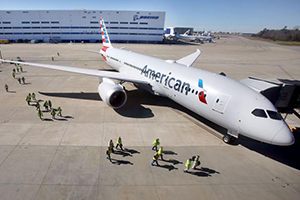
By David Wren
Complaints that Boeing Co. fired workers for supporting a labor union will still be heard despite a ruling this week that blocked the union’s attempts to get a foothold at the aerospace giant’s North Charleston campus.
The National Labor Relations Board said in a 3-1 ruling Monday that flight-line workers at the 787 Dreamliner plant can’t join the International Association of Machinists as their own separate group. The ruling puts an end to the union’s 18-month battle to organize 178 technicians and inspectors.
But unfair labor practice charges filed by the union against Boeing will continue to work their way through the system as the IAM tries to get five fired flight-line workers rehired.
“This is far, far from over,” said Bill Haller, the IAM’s associate general counsel.
A regional director for the NLRB last month said there’s enough conflicting evidence about the five firings to send the matter to an administrative law judge, who will take testimony under oath and determine whether Boeing violated federal labor laws.
Boeing said in a written statement that it “does not tolerate any form of retaliation” and disagrees with the regional director’s decision, but is fully cooperating with the labor board’s investigation of the charges.
“Each of these employees was discharged or otherwise disciplined for violating well publicized, longstanding and objectively reasonable safety and conduct policies, such as falsification of company records, failing to come to work and walking across an active runway despite direct contrary instruction,” the company said.
Three of the workers were fired for purportedly failing to notice a bird strike on an engine following a 787-10 test flight. Two others were fired for allegedly violating safety and other rules. The workers say they were fired for their union support, a charge Boeing denies.
Haller said the IAM will request an injunction calling for the workers’ immediate return to their jobs while the cases are pending. The NLRB would have to approve such an injunction. Read entire article
Published September 1, 2019 in The Spokesman-Review
Union Membership is Growing Again in Washington
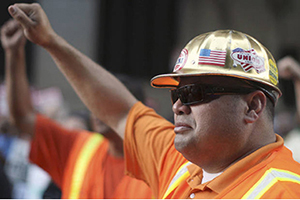
By Shawn Vestal
On this Labor Day, amid a longtime downward trend in national union membership and following a recent Supreme Court decision celebrated by union busters, it’s interesting to note that it’s a relatively good time for organized labor in Washington.
Union membership has been growing in this state for the past three years. Bureau of Labor Statistics figures show an increase of 150,000 union members in Washington from 2016 to 2018, about a fifth of all workers in the state. That’s one of the highest rates in the country.
A new report from the Washington State Labor Education and Research Center makes the case that union jobs are contributing to both workers’ and the overall health of the state in a variety of ways that go beyond the obvious matter of wages. And, as unions adapt to the needs of a younger generation of workers trying to negotiate the gig economy, public support is rising; A Gallup poll released last week showed 64% of Americans support labor unions, a rise of 16 percentage points since 2009.
It is, in other words, not a bad time for labor.
“I think there is some reason for optimism,” said David West of the research center, a project of South Seattle College.
Washington has long been a union stronghold, relative to a country where organized labor is in decline. The addition of new union members in recent years – with a boost of 65,000 in 2018 – followed a period of slight decline. One possible factor is that unions here have been gearing up in anticipation of the Supreme Court’s Janus decision earlier this year; the court ruled that unions cannot compel workers to pay dues or even fees to cover bargaining.
For public employee unions, that meant some workers who had not been union members but were paying a representation fee, had to decide whether to go all in or all out with their unions. David Groves, communications director of the Washington Labor Council, said unions have done a good job of reaching out to their workers and bringing more of them into membership in recent years.
He noted that the number of union members in Washington increased by a significant proportion over the number of workers represented by a union.
“I think a lot of that is attributable to Janus preparation,” Groves said, calling it a “positive consequence of a bad ruling.” Read entire article
Published August 19, 2019 in BloombergLaw.com
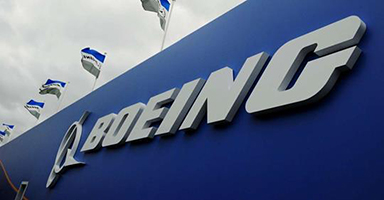
Boeing Hit With Labor Charges in High-Stakes Union Fight
The Protecting the Right to Organize Act aims to boost collective bargaining.
By Hassan A. Kanu
A machinists union scored a partial but significant win in a high-stakes battle to unionize Boeing’s South Carolina facility, thought to be a bellwether for labor’s potential to organize workers in the southern U.S.
Federal investigators concluded there’s merit to nine unfair labor practice charges filed by the International Association of Machinists and Aerospace Workers against Boeing Co., according to the union. The list includes allegations that six workers were illegally fired last year in retaliation for openly supporting the union, according to IAM officials.
The IAM won a union election on a 105-64 vote last year to represent a smaller group of technicians after losing a previous bid to unionize most of the more than 2,000 employees at the North Charleston plant. That was considered by advocates to be a significant achievement for labor, illustrating the potential for organizing even under “right-to-work” laws that limit union finances in much of the South. Boeing is still fighting that election, arguing that the union “gerrymandered” a slice of the plant’s employees after failing to persuade a majority of workers across the facility to organize under the IAM banner.
A National Labor Relations Board regional director’s decision to approve the charges isn’t a final ruling on the allegations. However, it indicates that the federal government found evidence supporting IAM’s claims and believes the company may have committed legal violations. The two sides will now go before an NLRB judge, who’ll hear arguments and issue a ruling.
The long-running dispute and Boeing’s decision to fire certain known union supporters after the successful election has become a political lightning-rod, drawing attention and input from lawmakers in South Carolina and other states, the largest business groups in the country, and members of Congress.
“The regional officials decided there was merit to our charges about discriminatory enforcement against these people, the six terminations, and we’re elated by that, especially in this political climate,” said IAM organizing director Vincent Addeo. “It’s a sign there’s some hope out there for workers trying to form or join a union no matter what kind of political power the employer has, and even in a place like South Carolina, where union density is the lowest in the U.S.”
Boeing previously has called the union’s unfair labor practice charges “baseless” and “entirely meritless.” Read entire article
Published August 17, 2019 at CNN.com

Workers Had 3 Options: Attend Trump's Speech, Use Paid Time Off or Receive No Pay
By Sarah Westwood and Yon Pomrenze
Workers at the Pennsylvania petrochemical plant where President Donald Trump spoke Tuesday were told that if they didn't attend the event, they either had to use paid time off or receive no pay for the day.
At least some of the workers who attended the speech were instructed not to protest the President, who told the crowd of workers at the Royal Dutch Shell plant he would be imploring their union leaders to support his reelection.
The instructions to the workers came in a memo, a copy of which was obtained by CNN's Polo Sandoval from a congressional source. That source was given the memo by a person in Beaver County, Pennsylvania -- the site of the plant.
"Your attendance is not mandatory. This will be considered an excused absence. However, those who are NOT in attendance will not receive overtime pay on Friday," read part of the memo.
Shell spokesman Curtis Smith confirmed workers were told they would also miss out on some overtime pay if they skipped the event. Shell said it did not write the memo.
The Pittsburgh Post-Gazette, which first reported on the memo and the ultimatum to workers, reported one contractor forwarded the information to workers based on a memo Shell sent to union workers. Smith, the spokesman for Shell, said language in the memo relating to workers' conduct, such as not protesting, did not originate from language passed on by the company.
"It was understood some would choose not to attend the presidential visit and were given the option to take paid time off (PTO) instead. As with any workweek, if someone chooses to take PTO, they are not eligible to receive maximum overtime," Smith, the spokesman for Shell, told CNN. Read entire article
Published August 6, 2019 in the Everett Herald

In Everett, Sen. Murray Touts New Bill to Union Leaders
The Protecting the Right to Organize Act aims to boost collective bargaining.
By Joseph Thompson
U.S. Sen. Patty Murray listened to local labor leaders in Everett on Monday to get their take on a bill that would make it easier for workers to unionize and collectively bargain.
The four-term senator touted the Protecting the Right to Organize Act with representatives from the Snohomish County Labor Council and the Teamsters, Machinists and other unions. The bill would impose penalties on companies that violate worker rights laws and boost protections for employees who protest or seek union representation. Murray said the bill is needed to help working-class Americans.
“I know here in Everett you know the importance of unions,” she said. “A lot of people talk about the economy being great, but I see too many people where it’s not working — people who go to work every day and don’t get the salaries they need and don’t get the support they need. Today we have an economy that works for those at the top and who invest in Wall Street, and corporations that are nameless. But the average workers are feeling less and less secure in this economy and we need to right that.”
The Senate bill has 40 co-sponsors, including fellow Democrat Maria Cantwell, Washington’s other U.S. senator. Murray said she doesn’t expect the bill to gain ground in the Senate without prior success in the country’s other legislative body.
“The exciting part is we have folks in the House who have picked this up,” Murray said. “That means people will start hearing about it and understanding the impacts.”
The House version was introduced by Rep. Bobby Scott, D-Va. Washington’s seven Democratic representatives, including Rep. Susan DelBene, D-Medina, co-sponsored the House version of the bill.
At the meeting in Everett, union leaders aired grievances about negotiations, low enrollment and declining benefits.
Murray said she consistently heard about companies intimidating employees trying to unionize.
Mike Raughter, an organizer for the Teamsters Union, said workers are voting against joining the union because of fear of retaliation by their employers. He said the added protections make the bill a “great equalizer.” Read entire article
Published August 4, 2019 at MSN.com
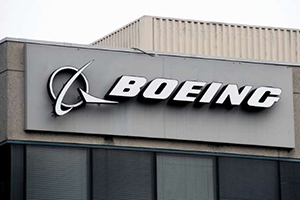
Behind the MAX Crisis: Lax Regulator, Top-Down Company Culture
By Chris Roberts
Even before the Lion Air and Ethiopian Airlines crashes claimed 346 lives, Boeing flight tests had revealed problems similar to those encountered by pilots on the ill-fated 737 MAX flights.
Company officials learned that its MCAS anti-stall system -- which is at the center of both accidents -- activated within minutes of takeoff, repeatedly pushing the nose of the aircraft down even when the plane was operating in normal conditions at lower speed.
This discovery, recounted to AFP by two former Boeing engineers who spoke on the condition of anonymity, suggested that mastering the MCAS was important for safely flying the MAX.
The MCAS should have been closely vetted by regulators, and procedures for operating the system should have been included in plane manuals and highlighted during pilot training.
But none of that happened.
Before the Lion Air disaster in October, the MCAS was not even named in the official documents given to pilots.
In the earliest documents submitted to the Federal Aviation Administration, Boeing said the MCAS would only activate under abnormal conditions, such as a sudden turn at great speed.
Boeing later amended its documents to say MCAS could be activated at lower speeds, but maintained throughout that there were no significant safety changes compared with earlier models.
FAA representatives were present during a test flight when an MCAS problem occurred, according to a regulatory source, but approved the MAX without independently studying or testing the flight system.
Instead, regulators deferred on key aspects of certification to Boeing, allowed under a congressionally-mandated program begun in 2005 while the FAA faced budget pressure.
In essence, Boeing chose the engineers who would inspect its planes in a process rubber-stamped by the agency. Read entire article
Published August 4, 2019 in The Observer

US Construction Workers Are Dropping Dead — Here’s Why
By Chris Roberts
What do good economic times in America mean? Building. Signs of a strong economy mean a forest of construction cranes in every city and small armies of contractors and workers digging, drilling and dying in the heat in increasing numbers, according to a recent study.
Anyone who has ever worked an outdoor job is well aware that the environment is a significant occupational hazard. You can’t really work on a roof or frame a house in the rain, but you can in the sun. In growing states like Texas, where the heat and the sun are merciless, working means sweating—and, increasingly, sweating until you die.
Between 1992 and 2016, 783 American workers died because of exposure to excessive heat, and nearly 70,000 were “seriously injured,” according to federal figures. Heatstroke, in case you didn’t know, is extremely bad even if you survive. Your organs can fail and you can suffer brain damage. One hot day at work can quite literally ruin, or at least negatively shape, the rest of your life.
Construction workers account for about 6% of the total workforce in the United States—a figure that does fluctuate during economic boom and bust cycles—but has accounted for 36% of heat-related deaths since 1992, according to a study published on July 22 in the American Journal of Industrial Medicine.
Construction workers’ risk of dying due to heat has steadily increased over time, researchers from the Washington, D.C.-area based Center for Construction Research and Training, the University of Illinois at Chicago’s School of Public Health, and Georgetown University’s School of Nursing and Health Studies found.
The culprit for the rise in heat-related deaths is, quite literally, climate change. Whether or not you choose to believe climate experts, the data shows that summer heat steadily rose between 1992 and 2016, the study period examined in the research. And with hotter weather comes an increased likelihood of succumbing to these temperatures.
Those workers most at risk for heat-related deaths are, generally speaking, the workers who enjoy the least rights in the Trump era: Latino workers, and particularly Latino workers born in Mexico. Read entire article
Published June 20, 2109 in The New York Times
A ‘Sorceress’ in Brazil, a ‘Wink’ in India: Walmart Pleads Guilty After a Decade of Bribes

By Michael Corkery
Inside Walmart’s corporate offices in Brazil, one local contact was known as the “sorceress” for the ability to obtain government permits quickly.
In India, concerns about bribery were met with a “wink and a nod” by Walmart’s local business partner. In China, money was funneled to a local landlord for “government relationship consulting services.” And in Mexico, cars and computers were donated to governments in communities where Walmart was planning to build new stores.
For more than a decade, Walmart used middlemen to make dubious payments to governments around the globe in order to open new locations, United States prosecutors and securities regulators said in a settlement agreement on Thursday. But even as employees frequently raised alarm, the company’s top leaders did little to prevent Walmart from being involved in bribery and corruption schemes.
That lack of internal control led to a seven-year inquiry that culminated on Thursday with Walmart’s Brazilian subsidiary pleading guilty to a federal crime. The guilty plea, and the $282 million in fines that Walmart has agreed to pay, capped one of the biggest investigations ever under the Foreign Corrupt Practices Act, which makes it illegal for American corporations to bribe overseas officials.
“Walmart profited from rapid international expansion, but in doing so chose not to take necessary steps to avoid corruption,” Brian A. Benczkowski, an assistant attorney general, said in a statement.
The investigation, which was conducted by the Department of Justice and the Securities and Exchange Commission, came after The New York Times revealed in 2012 that Walmart had made suspicious payments to officials in Mexico and then tried to conceal them from top executives at the company’s headquarters in Bentonville, Ark. And even when the issues reached the main office, an internal investigation essentially went nowhere. Read entire article
Published June 18, 2019 in The Stand

Freedom Foundation Keeps Spending, Failing
By Peter Starzynski
One year after Janus, the right-wing group’s plan to destroy unions in Washington and along the West Coast is a complete failure. In fact, its backfiring on them.
The Olympia-based Freedom Foundation has been making frivolous claims about the success of the anti-union campaign it has been running for the better part of five years and trying to position itself as the preeminent corporate backed, right-wing organization attacking unions along the West Coast.
Nothing could be further from the truth. After five years and more than $20 million spent, the Freedom Foundation (aka Opt Out Today) has been a massive failure.
In the fall of 2014, the Freedom Foundation, under then new CEO Tom McCabe, launched its so-called “opt-out campaign” in Washington by targeting home care workers, badgering them about their union membership and trying to persuade them to stop paying union dues.
Despite the organization’s tax-exempt status, which strictly prohibits spending for political purposes, McCabe made it very clear that the Freedom Foundation’s mission is to win elections for extreme right-wing politicians in order to push a pro-corporate agenda.
That year at a political fundraiser for Republican state Sen. Lynda Wilson, McCabe said, “When I got to the Freedom Foundation – it was about 13 months ago – I told my staff, ‘we need to fight unions.’ Because unions have corrupted [Washington], they have ensured that [Washington is] the bluest state in the country. And I told my staff, all these things we’re fighting for, whether it’s property rights, whether it’s lower taxes, whether it’s less government spending, whether it’s agencies that are duplicating efforts — all of that stuff cannot be accomplished until the power of unions has been dissipated, until we reduce that power of the union, until frankly we defund it.” Read entire article
Published Thursday, May 30, 2019 in TheHill.com

California Closer to Protecting Workers in ‘Gig Economy'
By Rebecca Klar
California is one step closer to protecting "gig economy" workers' rights, moving forward a bill that tightens regulations on company's like Uber and Amazon that classify some workers as independent contractors.
The state Assembly on Thursday passed a proposal by a 59-15 vote that would restrict corporations' ability to bypass labor laws.
The bill now heads to the state Senate.
The new law would benefit workers across a variety of fields, but the problem has seemingly grown with the rise of service apps.
"This kind of started with Uber and Lyft, but now we’ve seen a proliferation of this business model that is essentially built around this classifying workers as independent contractors and cheating those workers out of basic protections in the law," said Steve Smith, spokesman for the California Labor Federation.
The labor federation sponsored the bill.
"It's becoming a bigger and bigger problem, especially here in California and all around the country," Smith said.
If passed, the bill known as AB5 would codify into law the decision in the California Supreme Court Dynamex case. Last month's court decision ruled that businesses should follow the "ABC" test to decide if a worker is an employee.
Based on the Dynamex ruling, to deem a worker an independent contractor, a company must prove three points, according to Vox,: the worker is free from the company's control, the worker is doing work that isn't central to the company's business, and the worker has an independent business in that industry. Read entire article
Published Tuesday, May 28, 2019 in PewTrusts.org

Unions, States Confront Trump Home Care Worker Rule
Lynne Sladky/The Associated Press
Public-sector unions, struck last year by a U.S. Supreme Court decision that ended their ability to charge non-members fees, suffered another blow this month when the Trump administration blocked hundreds of thousands of Medicaid-funded home health aides from deducting union dues from their paychecks.
California, Connecticut, Massachusetts, Oregon and Washington state and, separately, the Service Employees International Union (SEIU) sued the Trump administration earlier this month over the new regulation, which they say also will stop the workers from making payroll deductions for health insurance premiums and training costs.
In their suit, the state attorneys general, all Democrats, said the rule will disrupt their longstanding labor arrangements and make it harder for home care professionals to work together to improve their jobs and better serve their elderly and disabled clients.
The move comes after the Supreme Court’s Janus ruling last June held that it’s unconstitutional to require a government employee who is represented by a union but not a member to pay so-called agency fees to support union operations, including lobbying. The ruling didn’t affect Medicaid-funded home care workers, because the court already had banned unions from charging them agency fees in its 2014 Harris v. Quinn decision.
The new Centers for Medicare and Medicaid Services (CMS) rule forbids states from diverting Medicaid dollars meant for providers to third parties, such as other companies or organizations. It’s expected to affect payroll deductions for home care workers who don’t have a conventional employer, because they’re paid by the state but hired and fired by their clients.
State lawyers and administrators have begun parsing how the rule will affect home care services when it goes into effect in July. Union officials are trying to figure out another way for workers to pay dues, such as asking them to mail a monthly check. Read entire article
Published Monday, April 23, 2019 in TheStand.org

Durham Drivers in Everett Join Together with Teamsters 38
The following is from the Teamsters union:
EVERETT— Earlier this month, drivers at Durham School Services in Everett voted by more than a three-to-one margin to join Teamsters Local 38. The 127 workers are part of a growing movement of drivers and monitors who are organizing with the union because of the representation and benefits that come with a Teamster contract.
“The solidarity that Durham drivers maintained from start to finish in this organizing campaign is something to be very proud of,” Local 38 Secretary-Treasurer Steven Chandler said. “Local 38 and the Durham drivers worked countless hours to ensure that our organizing plan worked. Our efforts paid off for the betterment of these new Teamsters.”
Durham driver Dan Jones is a member of the organizing committee at the Everett school bus yard. He worked very closely with Local 38 Business Agent and Organizer Mike Raughter, along with many others, to ensure that the campaign was a success.
“I am proud of my fellow co-workers and the results of this election,” Jones said. “This wasn’t just a ‘yes,’ this was a resounding yes! This is the way we want to move forward with Local 38.”
“This Durham organizing campaign was driven by the commitment and perseverance of the committee,” Raughter said. “They want a voice in their workplace for themselves and their co-workers, and they delivered that message overwhelmingly. I couldn’t be more happy for our new Teamster sisters and brothers.”
Teamsters Local 38 represents workers in a wide variety of industries throughout Snohomish County. If you live and work elsewhere in Washington state, visit the Teamsters Joint Council 28 web page to find out which local to contact near you.
http://www.thestand.org/?p=76110
Published April 11, 2019 in The Washington Post
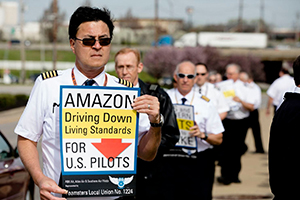
The Amazon Air Pilots Who Deliver Your Parcels are Prepared to Strike
By Abha Bhattarai and Kevin Williams
Amazon has become a retail powerhouse in part because of its promise of two-day delivery on millions of items. But now some of the pilots who transport the company’s packages are speaking out against what they describe as low wages, shoddy maintenance and stalled contract negotiations.
Roughly two dozen pilots in crisp white uniforms picketed on a busy thoroughfare near the Greater Cincinnati Northern Kentucky International Airport on Thursday, calling for better pay and benefits, and less erratic schedules. They held signs that said “Amazon: Driving down living standards of U.S. pilots” while passing motorists honked. The protest, organized by the Airline Professionals Association Teamsters Local 1224, comes weeks after an Atlas Air flight carrying cargo for Amazon crashed in Texas, killing all three people on board.
“Work has exponentially increased," said Mark Bly, who has flown for Atlas Air for 20 years and says he hasn’t received a raise in nearly a decade. “It was once a sleepy carrier. Now there is more work than ever.
Bly begins working before dawn and said he sometimes clocks in 18-hour days. The pilots, who work for three airlines that serve Amazon, said they are paid less than half the industry average and are frequently booked on last-minute flights during their days off. That, they say, has led to high turnover rates and concerns about fatigue and burnout. More than 60 percent of pilots who fly for three carriers -- Air Atlas, Southern Air and ABX Air -- said they are looking for work at competitors like UPS and FedEx, according to a union survey. Read entire article
Published Wednesday, April 6, 2018 in the Everett Herald
Trade UP Event Lets Teens Try Their Hand at a Variety of Jobs
By Kari Bray
Herald Writer
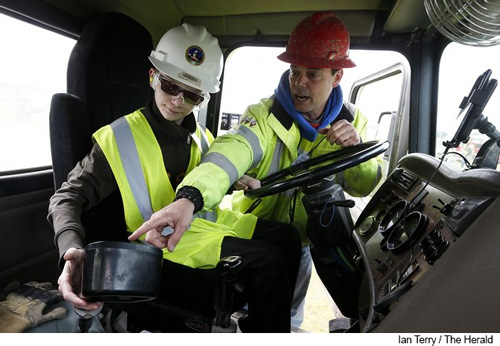 ARLINGTON — Lunch arrived at 11:30 a.m. and 28 teens in bright yellow safety vests filed into the break room.
ARLINGTON — Lunch arrived at 11:30 a.m. and 28 teens in bright yellow safety vests filed into the break room.
They set their hard hats on the tables and tucked into plates of enchiladas, rice and beans.
The meal marked the halfway point in a day of job sampling. The teens sprayed a firehose across a field, chipped away at a cement block with a pavement breaker, poured cement from a cement truck and sat in the driver's seat of a Community Transit bus. They also handled packages in the back of a UPS truck and learned how to connect and disconnect power lines on a replica of the top of a utility pole.
Students between the ages of 16 and 18 came from around the county to Tuesday's Trade UP event at the Arlington Municipal Airport. It was the second Trade UP event ever in Snohomish County and the first of two happening this month. The next one is at the Sno-Isle Skills Center in Everett on April 12. It's full, said Erin Monroe, president of Workforce Snohomish. They're expecting about 60 students.
Stanwood Mayor Leonard Kelley came up with the idea for Trade UP and worked with Workforce Snohomish, the Snohomish County Labor Council and local businesses to put it together.
“College isn't for everyone,” he said. “We need to find a way to reach these kids.”
Their eyes light up when they use a power tool or firehose, Monroe said.
“One thing I love about this is it allows kids to have a hands-on experience in a very brief way,” she said. “Unlike a career fair where you get handed a brochure, here you get handed a jackhammer.”
Students were divided into groups of four to six and went around to six stations, spending about 40 minutes at each. The stations had equipment and trainers from Community Transit, North County Fire & EMS, Snohomish PUD, Stanwood Redi-Mix, UPS and the Northwest Laborers-Employers Training and Apprenticeship Program. Read entire article
Published Friday, March 8, 2019 in The New York Times Magazine
Dollars on the Margins
By Matthew Desmond

In 2014, Julio Payes was working 80 hours a week at two full-time jobs. A permanent resident from Guatemala who came to the United States on a work visa, Payes labored in Emeryville, Calif., a city of roughly 12,000 residents and almost 22,000 jobs, sandwiched between Oakland and Berkeley. He began his day with the graveyard shift at a 24-hour McDonald’s, where he served burgers and fries from 10 p.m. to 6 a.m. Afterward he had two hours to rest and shower. Then he’d clock in at Aerotek, going anywhere the temp service sent him between 8 a.m. and 4 p.m. To stay awake, he loaded up on coffee and soda. Each job paid minimum wage.
“I felt like a zombie,” Payes told me. “No energy. Always sad.” Yet just to afford basic necessities, he had to work up to 16 hours a day, seven days a week. Back then, he and his mother and two siblings all shared a single, unfurnished room. They were a tight-knit family, but Payes’s work schedule kept him away. Once, his younger brother, Alexander, who was 8 at the time, told him he was saving money. “I want to buy one hour of your time,” Payes remembers his brother telling him. “How much for one hour to play with me?” Payes looked at his brother and wept. Not long after that, Payes fainted from exhaustion in the aisle of a grocery store. He was 24.
It was around that time when the Emeryville City Council began to reconsider the city’s minimum wage. Oakland had just passed a ballot initiative to increase its minimum from $9 to $12.25 an hour, and Emeryville set out to match it. Then the mayor, Ruth Atkin, began asking if her city could do more, recasting the city’s minimum wage into something closer to a living wage. When Payes caught wind of this possibility, he began to pray. He prayed during Sunday and Wednesday revival services, where he danced and shouted as the spirit moved him. He prayed in quiet moments at home. “God, he believes in justice,” he said. “I have faith. But I also have politics.”
Payes became active in the Fight for $15 political campaign, participating in marches and other shows of collective force. “The first time we did a strike, I felt very nervous,” he said. But when he showed up in his work uniform and saw a mass of fast-food workers, thousands strong, he found his voice. It felt like church.
Published Tuesday, March 5, 2019 in TheStand.org
Let’s Take Health Care Off the Bargaining Table
By Larry Brown

Union members enjoy some of the best health care that working-class Americans can expect to receive. Unions have fought long and hard to establish and maintain these benefits and they are justly proud of their achievements. In the absence of a national health plan, they have sacrificed much to negotiate a modicum of security for their members and their families.
More than half of all Americans still access health care through employment-based benefit plans. There is a myth that Americans love their health plans and want to preserve them at all costs. But providing an important public good like health care as a benefit linked to employment rather than as a right available to all is an accident of history. This linkage is not only a bad idea, it is also simply unsustainable.
No other advanced industrialized country links health care to employment like the U.S. does.
Workers in other countries don’t have to fear losing their health care when they lose their jobs, nor are they chained to a job that they hate because they need the health care coverage. They don’t have to worry about their children aging out of their health plans or of losing their benefits as a result of a long-term illness that disrupts their employment. They are not subject to the constant churning of health plans and provider networks and the confusing and ever-changing array of deductibles, co-payments, out-of-network charges that even the best of plans impose on their members.
And importantly, these employer-based health care plans put American companies at a competitive disadvantage against rival businesses in other countries that have national or single-payer health care systems.
The Milliman Medical Index reports that total health care costs for a family of four with decent employer-provided coverage exceed $28,000 per year. This comes to $14 per hour worked by a full-time employee. The average employer pays nearly $16,000 towards those costs and the worker picks up the remaining $12,000 through a combination of payroll deductions, co-pays and deductibles. The total costs have consistently increased 2, 3 and 4 times faster than the rate of inflation. And the percentage paid by the worker has gone up nearly every year since 1994. Read entire article
Published Monday, March 4, 2019 in The Seattle Times
Boeing Machinists Union Wins Mid-Contract Pay Raise
The Machinists union has negotiated an unusual mid-contract pay raise for about 16,000 of its members at Boeing, winning a $4 per hour increase of minimum pay rates. The agreement comes after Boeing, facing a worker shortage in the region's tight labor market, raised pay rates for new hires.
By Dominic Gates
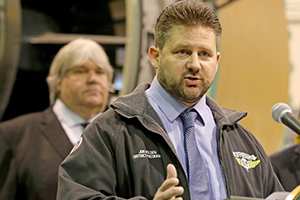 |
|
Jon Holden heads up the International Association of Machinists District 751, which negotiated a pay raise for its members even though their contract wasn’t up. (Greg Gilbert / The Seattle Times, 2018) |
Boeing’s Machinists union has negotiated an unusual mid-contract pay raise for thousands of its members, winning a $4-per-hour increase of minimum pay rates.
The Machinists’ current contract, ratified five years ago, set pay rates through 2024. However, last year, after years of layoffs and attrition, management responded to an acute labor shortage in some areas by offering new hires wages that were higher than stipulated in the contract.
That meant some new hires were earning more than their colleagues in the same job, so the union successfully argued that management needed to fix the disparity by raising minimum pay rates in the contract.
In a bulletin issued to its members, the International Association of Machinists (IAM), District 751, explained that the union has the legal right to demand to negotiate over the impact whenever management unilaterally changes “working conditions or company policies.”
“When an employer changes our working conditions, we have choices to make to protect our members,” the bulletin said. “You all understand the morale issue this caused in the shop.”
For Boeing, the agreement will make it easier to hire people in the region’s tight labor market, where minimum-wage laws in cities including Seattle mean even many fast-food franchises are offering starting wages of $15 per hour.
In a statement, the company said it is committed to offering competitive pay.
“We want to ensure we are compensating employees for their valuable work and enhancing our ability to attract, retain, and engage employees,” Boeing said.
District 751 president Jon Holden said about 16,000 Machinists, more than half of his members, will get a pay raise as a result. Read entire article
Published Wednesday, February 20, 2019 at www.thestand.org
Teamsters Vote to OK Strike at Industrial Container Services
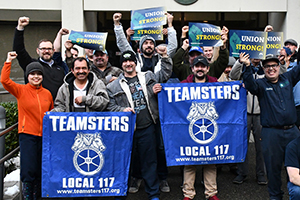
The following is from Teamsters Local 117:
SEATTLE (Feb. 20, 2019) — Teamsters at Industrial Container Services (ICS), a steel drum and container supplier in Seattle, are not backing down. After months of being bullied by their employer in contract negotiations, the group is fighting back. On Feb. 16, after an update from their union committee on the company’s substandard proposals, members voted unanimously to authorize a strike.
With the vote, the group sends an unequivocal message to their employer that they are united and won’t be jerked around.
“All of us are united in demanding that they negotiate fairly,” said Abel Flores, a nine-year employee at the company. “We need them to respect our rights, and we need to see improvements in their proposals.”
ICS has refused to engage in meaningful negotiations and made unilateral changes to working conditions, laying the groundwork for a possible ULP strike. What’s more, ICS wants members to take a major step backwards on their health and welfare coverage while at the same time they want to hitch members’ wages to the minimum required under the law. They’ve even tried to divert previously agreed to retirement contributions from the existing contract into their new wage proposals.
The group is not having any of it. “It’s not fair that they’re treating us like this, under these conditions,” said Iduviges Castro Sanchez, an eight-year employee. “If they won’t come to a fair agreement with our Union, we’re ready to strike.”
Teamsters at ICS are no stranger to a fight. In 2014, they showed tremendous courage in standing up to their employer to get organized. Read entire article
Published Monday, February 11, 2019 at insiderlouisville.com
UPS Mechanics Ratify New Contract with 18 Percent Immediate Raise
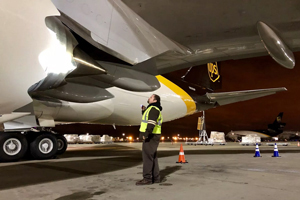
By Boris Ladwig
UPS aircraft mechanics have ratified a new five-year contract that will give them an immediate 17.72 percent raise for a base pay of about $123,000 per year. Over the life of the contract, base pay will increase 32.61 percent, to about $139,000.
The new contract also makes no changes to employee premiums of a key early retirement health care benefit that had been one of the sticking points in protracted negotiations. UPS and Teamsters Local 2727, which represents about 1,400 mechanics and related employees, including about 550 in Louisville, had been negotiating since October 2013.
Mechanics had received no raises during negotiations, which means the 17.72 percent immediate base pay increase translates into a roughly 3.5 percent annual raise since negotiations began. And the 32.61 percent raise over the life of the contract actually means a roughly 3.3 percent annual raise between 2013 and 2023. In the last five years, UPS has recorded net income of $21 billion. Net income of nearly $4.8 billion in 2018 was 16.3 percent higher than the average net income in the last five years.
The union said in a news release that the contract “makes UPS Air Cargo mechanics the highest-paid air cargo mechanics in the country by a wide margin.” UPS spokesman Mike Mangeot told Insider via email that the new contract allowed the company to reward its employees “while managing our business effectively.”
Negotiations had dragged on for more than five years in part because they are governed by the Railway Labor Act, a federal law that makes it more difficult for the parties to initiate a strike or lockout. Any such action has to be approved by the National Mediation Board, a government agency that has been charged by Congress to oversee labor contracts in railroad and airline industries to avoid severe economic disruption. Read entire article
Published Monday, February 4, 2019 at CBSnews.com
Airline Mechanics Feel Pressured to Overlook Potential Safety Problems: "Accident Waiting to Happen"
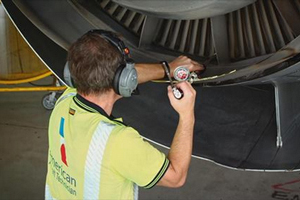
Airline mechanics say they feel pressured by management to look the other way when they see potential safety problems on airplanes, an eight-month-long CBS News investigation reveals. In some of the cases, the Federal Aviation Administration (FAA) agreed with those mechanics.
The U.S. aviation system is experiencing an unparalleled period of safety, with only one death involving a passenger airline in the last decade. But in our interviews with more than two dozen airline mechanics, they speak of the pressure to turn aircraft around faster that sometimes can be too much, reports CBS News correspondent Kris Van Cleave. They blame it on an economic reality of the airline business: a plane only makes an airline money when it's flying passengers.
Cell phone video captured a tense exchange between an American Airlines mechanic and a manager in 2017.
"We're an accident waiting to happen," the mechanic could be heard saying.
The FAA found reason to believe a Miami-based mechanic was retaliated against after reporting problems that pulled several planes out of service.
"You single out one guy because he's doing his job. What about all of us? What's going to happen to us when we do our jobs?" the mechanic can be heard saying.
Gary Santos, a long time American Airlines mechanic based in New York, described it as "a short-cut environment." He said he's risking his job by speaking on camera.
"They try to pressure the individual not to write it up," Santos said.
"They'd rather you not report a maintenance issue?" Van Cleave asked.
"Right," Santos responded.
While a sometimes tense relationship between management and mechanics is not uncommon, every one of the 26 airline mechanics we spoke to – two thirds from American and the rest from Southwest Airlines – described being pressured by managers to focus only on the work assigned. Read entire article
Published Wednesday, January 30, 2019 at fortune.com
While Everyone Was Focused on the Shutdown, the White House Rolled Back Worker Safety Rules

By Erin Corbett
President Donald Trump may have run his 2016 campaign as a champion of the working class, but his administration seems to be chipping away at worker protections.
During the president’s 35-day partial shutdown of the federal government, the White House quietly dissolved a 2016 regulation requiring certain employers to electronically submit reports of workplace injuries to the Department of Labor.
The Improve Tracking of Workplace Injuries and Illnesses regulation, enacted under the Obama administration, required employers to submit injury and illness data to the Occupational Safety and Health Administration (OSHA). The data would be used to help determine unsafe work conditions, and the public disclosure of workplace injuries was intended to urge employers to improve safety in the workplace. The rule also protected workers from retaliation from employers when reporting.
Trump officials first stalled the electronic reporting rule in 2017, and amended it last summer to drop the requirement for employers to submit detailed injury reports to OSHA, Vox reports. The final amendment was reviewed by the Office of Management and Budget over the course of just six weeks, and published on Jan. 25, during the shutdown.
Labor rights and public health groups, including the Public Citizen Health Research Group, the American Public Health Association, and Council of State and Territorial Epidemiologists filed a lawsuit in the U.S. District Court, stating that the regulation should be declared unlawful.
Defendants included Department of Labor Secretary Rene Alexander Acosta, the Department of Labor, and OSHA. Read entire article
Published Wednesday, January 9, 2019 at CNBC.com
The Government Shutdown Spotlights a Bigger Issue: 78% of US Workers Live Paycheck to Paycheck

By Emmie Martin
The partial government shutdown, which began Dec. 22, has now stretched well into the new year. President Donald Trump said Friday that it would continue for "months or even years" until he receives the requested $5 billion in funding for a border wall.
The shutdown has left approximately 800,000 federal workers in financial limbo. Around 420,000 "essential" employees are working without pay, while another 380,000 have been ordered to stay home, according to calculations provided to CNBC by Paul Light, a professor of public service at New York University.
In some cases, the furloughs have forced government employees to tap into their savings, rely on credit cards or crowdsource funds to make ends meet.
Government workers are far from alone in feeling stressed about not getting paid. Nearly 80 percent of American workers (78 percent) say they're living paycheck to paycheck, according to a 2017 report by employment website CareerBuilder. Women are particularly vulnerable: 81 percent of them report living paycheck to paycheck, compared with 75 percent of men.
Tony Reardon, president of the National Treasury Employees Union, tells CNBC that the group has heard from hundreds of frantic federal employees. "They're scared," he says. "They don't know how they're going to put food on the table."
https://www.cnbc.com/2019/01/09/shutdown-highlights-that-4-in-5-us-workers-live-paycheck-to-paycheck.html?fbclid=IwAR2XPWeOjHcCUEPK0dCts8TVHBLwtRkKAg_g4CkSPD1ZsZ6pT30aafxh2ug
Published Wednesday, January 9, 2019 at CBSnews.com
Feeling Poorer? That's Because ‘Real’ Wages Fell Last Year

By Aimee Picchi
The pay people take home after accounting for inflation fell 1.3 percent last year, a new analysis shows. The findings come a year after President Donald Trump signed the Tax Cuts and Jobs Act, with his administration promising it would deliver "immediate" wage growth to workers.
Yet many workers' wages aren't keeping pace with the cost of living, compensation-data company PayScale found. That's concerning because it indicates more Americans are falling behind -- despite seeing the lowest U.S. unemployment rate in nearly 50 years -- and could struggle to maintain their standard of living when the next recession inevitably rolls around.
The tax law is 1 year old -- here are the winners and losers
PayScale examined the difference between nominal wages -- what you're paid on paper -- and a paycheck's actual purchasing power after accounting for inflation, or what economists call "real" wages. If pay growth is lower than the rise in the cost of living, a worker will have less purchasing power.
That may explain why Americans reported an anxiety spike about personal finances last year, with nearly three-fourths of women and three-fourths of young adults ages 18 to 34 saying they were somewhat or extremely anxious about paying their bills.
The dip in real wages also is notable as it came during a year when corporations got generous breaks thanks to the Tax Cuts and Jobs Act. Instead of providing higher wages, however, many companies used the money to repurchase shares, which reached a record $1 trillion last year.
"Although there are positive macroeconomic indicators, it's not a guarantee, and not everyone is experiencing the benefits," said Katie Bardaro, chief economist at PayScale. "Wages aren't moving at the rate they should be unless you are in in-demand jobs." Read entire article